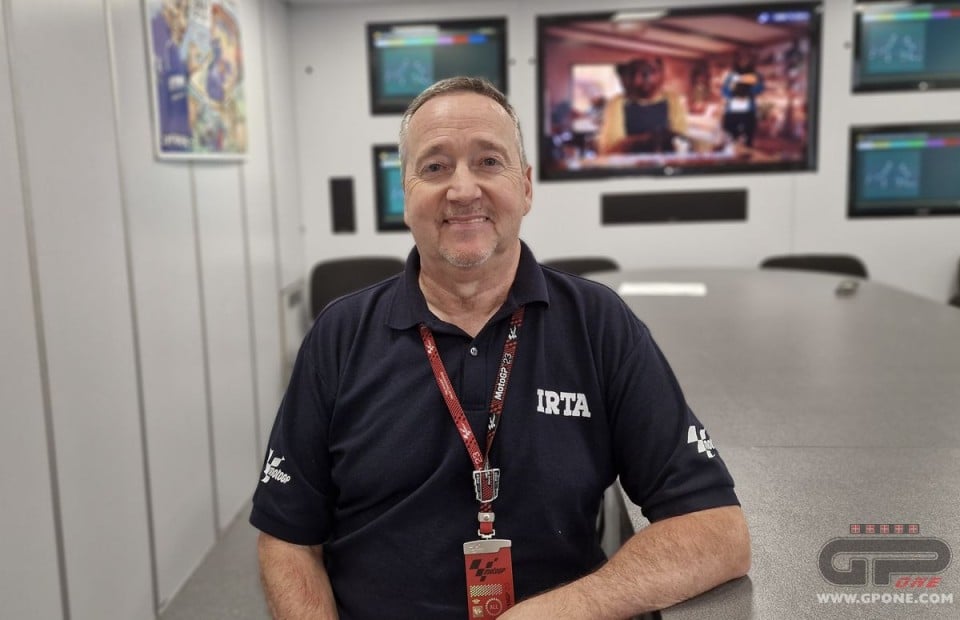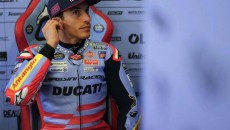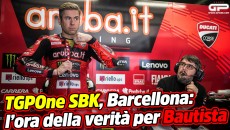Freddie Spencer is one of the great world champions, writing memorable chapters in the history of this sport. Having retired from his role as a rider, he had to face various personal challenges but probably the most difficult is the last one, namely that of being the President of the MotoGP Stewards Panel. In other words, Fast Freddie has the honourable but thankless task of being the sporting judge par excellence of the world championship. He is part of a very large working group, but any decision that is made can always be traced back to his name.
Needless to say, since he took office in this role there have been several controversies, because as always there are those who love to criticize the work of others, often forgetting its delicate and complex nature. At Barcelona we had the opportunity to talk to Freddie, who was more than willing to discuss the topics with us. From the way in which the group he works with has grown to the progress made by technology, including the way in which social networks have changed and are changing the perception of this sport and of the riders.
Let's start with the thorniest topic. Since you've been head of the Steward Panel there has been a lot of controversy, but this is a very complex sport. Try to explain how your job works.
"It's certainly a fluid sport. Often people don't quite understand what they're watching. Let's go back for a moment: when I started this job, we had four cameras, basically we had just started exploring the issue of track limits with lasers and sensors, we had recently started using yellow flags in a certain way. But since then we have grown a lot, we have optical fibre which is much more precise for track limits. We apply the rule of yellow flags more severely. We have a team of three people, there are seven people who constantly check the track limits, we have advanced control units in race direction for GPS. Just think that since I've been here, there have been more than 7000 cancelled laps and we have to carefully check each of these. There are many parties involved, a great responsibility. The way of making decisions has also evolved together with all the technology we have today and also the way we assess accidents".
So basically, it's not easy.
"There are certain very deep levels at which certain situations are analysed. Take the race at the Red Bull Ring for example. Many people saw the incident and simply thought it was a case of some riders taking other riders out. But what are you looking at is the rider’s intention, the causes and the effect of an event. The way in which one rider allows another to see it. There are so many variables that contribute and are often not understood by those who observe from outside. We always try to improve, fortunately our tools improve every year. Now we have 70 cameras on the track, not 4. I would say that there have been many improvements. Even when dealing with situations such as those in Moto3 in which the riders go slowly to wait for others. With all of these cameras we do a better job, it allows us to make the decisions that are best for us at that moment."
Some people think that you come from an era in which bikes were different and this makes it impossible for you to judge what is happening on the track today.
"No, not for me. The bike is basically the same. One of the things that is always talked about is contacts on the track. We started to deal with this problem in a very different way than last year, the riders in the Safety Commission often talk about it. In the end, changes can change the way you ride and I agree with this vision. It happened in the Safety Commission at Le Mans that we spoke with the riders, after the contact that had taken place between Bagnaia and Miller in the previous race. And basically there we decided to change the position. I don't want to beat around the bush, today's races are super competitive and everyone is very close because the bikes are all very fast. For this we need to act differently, set limits. The riders talk about it very often and we made them understand, even after Bagnaia's words in the Safety Commission, that a lot of responsibility for what happens lies with the riders themselves. The stewards are in charge of analysing situations, but it's all about safety. If they involve us in some episode relating to safety, we are there, we want to intervene. But they are riders, they are races. These guys are the best at what they do. Someone says that the power of the motorcycle affects the safety. But I don't think it's really like that in the end, for me that's not the decisive point".
Freddie Spencer: "I started in dirt track, I know well what happens in group races"
When you were racing, however, there was often a small group that went at completely different speeds, while today the differences are minimal and there are often a lot of laps with large groups of riders.
"Yes, but I also raced in flat track. And today the MotoGP is a bit like this, they're all very close, this is how they race today. Certainly seeing hard-fought races, in which everyone is close, is wonderful. But That's just the point I was making earlier, it's all in the hands of the riders sometimes. I often understand their frustration with certain things because I've been a rider myself. But there are rules and how we make sure they are enforced is only addressed to ensure that they can do their job best, which is going fast on the bike. We have to work together, we can't think separately. Today's races are great, but it's clear that they have to understand that performing manoeuvres that can becoming dangerous is not acceptable today. We give long laps, we swap positions between the riders. But this shouldn't be an effect, but a reason to avoid finding yourself in certain situations. As a rider, I think it's always in the rider's hands the responsibility for what happens on the track. I too grew up in hard-fought dirt track races and those races require you to be much more attentive to those around you, to be very aware of the situations you may find yourself in. In short, conscience is needed".
This world is different from that of 1983. Do you think that social networks and all the attention paid to every single moment of the riders’ life have deprived them of a certain freedom?
"Certainly social media networks have changed everything. Whatever a rider does, he immediately becomes the centre of attention of the world. And I also see it about my work. It is normal that there are so many criticisms, but I accept it. Everything changes, everything evolves. Take what happened at Goodwood a few weeks ago. I relaxed, I was able to jump on my Honda three-cylinder 500. It was great, but I also saw everything that riders have to experience today. In a certain way in my period as a rider I could concentrate more. We all know personalities like Kenny Roberts or Randy Mamola. But everything was different at the time, there wasn't all the attention that riders get today. I am convinced that today many riders are the way they are for social media. It's too easy for 'normal' people to closely observe everything they do and this changes everyone's mental attitude".
Do you think Moto3 and Moto2 are still really training categories?
"We know that there is a great challenge in Moto3 which is precisely due to the characteristics of the bikes. The riders adapt, and obviously they have to deal with issues such as aerodynamic resistance, slipstreaming. It is important for them to follow another rider. But one of the things I pushed on even talking to them is that to really learn, you need to ride alone, away from the others. It teaches you how to manage grip, it makes you a better rider in the race. I grew up in the United States in Club races and all the bikes were the same. I understand what you're saying, but I think riders can prove their worth even if they ride bikes that are similar to each other, maybe even more so. There are more opportunities if they are smart and that's what I try to explain I tell many guys not to stick together in a big group on the track, because in that scenario you don't learn anything and it can get you into trouble, both for safety and for the classification due to all the possible penalties".
But sometimes we see riders jumping from Moto3 to Moto2 and not being able to express themselves, as well as for MotoGP. It depends on what?
"Of course there are things that have helped in the past. Take Valentino Rossi. For me when he moved from 500 to MotoGP, as well as for the others, the fact that the only traction control he had was in his wrist helped. When a rider has certain sensibilities, he handles things in a certain way, it means that he knows how to ride beyond the limits of the bike. They often ask me what made the difference when I was racing. The fact is that when I was racing, if the brakes didn't work, if you happened to have a tyre that wasn't perfect or you had any problem, you had to adapt and we knew how to do it, we knew how to make sure that the lap times didn't drop. We changed the way of riding, the way of taking a curve or braking, but the stopwatch didn’t lie, the time was the same. We adapted. And it is this, believe it or not, that helps me understand exactly what the riders are doing on the track today. My ability is to know what a bike does in any situation, I see it. I understand the trajectories, the lines and everything else. Does electronics help much today? Of course it does, but it's normal, it's natural evolution".
Do you like the current MotoGP bikes or do you think today it’s a bit too much?
"There are many more components on motorcycles today than before. Electronics, aerodynamics. But it's evolution, change. This is how our world has changed. It's not a question of whether you like it or not. Today it's like this, period. You know that there is talk of new regulations, they will come in the future. Do I like it today? Today that’s the way it is".
Freddie Spencer: "There's more quality in today's riders than my rivals at the time, I respect everyone"
Do you see the character of some of your rivals in today's riders? In your opinion, are there a Mamola, a Roberts, a Lawson in the current paddock?
"I don't want to associate any of the current riders with those I was racing against. However, I can tell you that in general I see more quality in today's riders than my rivals. They train a lot, from all points of view. They are all professionals. I like Fabio's talent, Pecco's smoothness. Each of them has an enormous talent, I respect them all for different reasons. It's one of the reasons why I agreed to do this job when they asked me, because I love this sport. My goal is to make the whole system grow here, to better analyse situations, to give these fantastic talents the opportunity to do their job better."
Would you like to try the current bikes?
"I've tried some modern MotoGP bikes, both the 990 and the 800. But not exactly the latest. The last ones I tried dates back to 5 years ago. I think that if it will happen to me, maybe I'll get on a Ducati, who knows!".
MotoGP is passion, emotion. But then you have to make decisions based on facts and you are often criticized. How do you react?
"That's the point. What people don't understand is that there are also so many emotions behind this job. Our job is important, as is that of everyone involved here. At the same time it's a job, and in my case it's about looking at each situation in detail, analysing it, understanding the intent of a rider, the impact of a manoeuvre on the race. And this aspect cannot be based on feelings or emotions in judging. There are protocols to apply and what we have done over the years was created precisely to create these protocols. One of my intentions with this interview is also to explain the work we have done, how much the whole work system has grown over the years".
It seems that the riders are getting organized to have an association. What do you think about it?
"In 1984 we created a riders' association. Randy and Sarron had thought about it. Then everything changed, then Dorna arrived. But of course it would be a good thing. I remember that the first thing we as riders brought was to talk more about safety. But the second was to place a ceiling on the minimum salary for private riders. We immediately doubled the race prize for private riders and not for us who were the official riders. We were only ten official riders. I firmly believe that the riders involved are all important. There was no organization like this world championship is today, we were paid much less than F1. I think that from a certain point of view it was also the basis of the growth of the whole movement, for me it was great. Then came Dorna, everything became professional. But for me it's a good idea, if they do something constructive it's undoubtedly a good thing."











